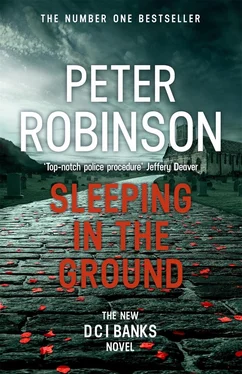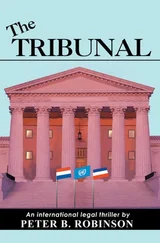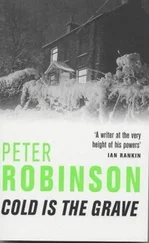But Gerry felt he was still close. She didn’t know why, and it wasn’t a feeling she would share with DI Cabbot or the boss, but she felt it, nevertheless. He was nearby, watching, enjoying the results of his handiwork. There was even a chance that he hadn’t finished yet. She had no idea whether he had planned any more killings, or even whether he had managed to get his hands on any more firearms, now that Edgeworth’s AR15 and Taurus were in the police evidence locker, but she somehow felt he hadn’t finished what he came to do.
So she was trying to find someone who lived a relatively hermit-like existence — but not too reclusive as to be suspicious — for perhaps only a short while. That set some limits. She would first check the out-of-the-way places, including empty properties where he might squat without being discovered. There probably weren’t many, but there would be a few decrepit barns and old shepherd’s shelters if he didn’t mind living rough. Of course, he would need somewhere to park his car, and he might have used a nearby public car park. But on second thoughts, she quickly ruled them out. Given the magnitude of his intended crime, she didn’t think he would want to take even the slightest risk of being seen to break the law before he got started. On the other hand, she had decided from his shopping habits that he was either parsimonious or short of money, so she could also rule out any higher priced properties or rentals. That should whittle the list down a bit; prices being what they were in the area these days, it was difficult to find an affordable cottage or flat. There were a few converted barns, but even they were pricey, and he would have stood out like a sore thumb in a student flat in Eastvale. His needs would probably be simple: a roof over his head, a bed or somewhere to set down a sleeping bag — though she ruled out camping because of all the rain — and solitude. The sort of place a poor writer or artist might be able to afford. Ray Cabbot might be able to help there. His resources weren’t exactly limited, but he had been checking out properties all around the county since before Christmas. He didn’t make her as nervous as he had when they first met. Somehow, hearing Annie talk about him and watching the way she dealt with him gave Gerry confidence. Ray Cabbot might not be a pussy-cat or a saint, but he was no abusive predator either.
There were certain routine things that could be done fairly quickly by telephone, such as checking the voters’ registry at the council offices — though a man on the verge of mass murder might be expected to be relatively uninterested in who his next MP or councillor was going to be — and the land registry, which would give her the name of the owner, from which she could also perhaps get the names of anyone who had rented from him. Then there were the utilities that just about everyone had — gas, electricity, Yorkshire Water — and after that telephone companies, Internet providers, the Department of Vehicle Licencing, the post office, HMRC and many more.
She wasn’t stupid enough to imagine that he would have used his own name or real previous address, but whatever details he had given the seller or renter might also help determine who he was and help locate him. And she had the advantage of Ray’s sketch.
The problem was that Gerry didn’t have time to do all this work herself. It would mean hours on the phone, perhaps even traipsing about the countryside, visits to out of the way places, false trails galore. And she had other things to do. Would AC Gervaise authorise the manpower? Doug Wilson could help, for a start. He didn’t seem to be doing much these days. And maybe with the addition of a couple of ambitious uniformed officers, that would be enough to get things in motion. Surely the AC couldn’t object to that.
There was only one way to find out.
Banks and Charlton crossed the road and walked up Branch Road, past the Western and back of the Tesco Express, on to Town Street, where most of the shops had foreign names. The pub had clearly seen better days, but they found a quiet corner in the lounge bar, where the noise of video machines and dreadful pop music was distant. Charlton offered to get the drinks. Banks asked for a coffee and wouldn’t be talked out of it. He didn’t want to be driving in Leeds traffic with even one alcoholic drink in him. He had let DCI Ken Blackstone know he would be on his patch that day, and they had arranged to meet in the city centre later for dinner and drinks. There was a good chance they would take a taxi and Banks would spend the night in Blackstone’s spare room.
‘It’s not so bad here during the day,’ said Charlton, ‘but it gets a bit edgier by night. It’s almost all Eastern Europeans these days, as you could see from the shops. First the Poles, now it’s Romanians and Bulgarians.’ Banks had been in the area before on more than one case over the past couple of decades, and he was aware that now the once Northern English working-class neighbourhood was very much dominated by Eastern European immigrants. There was even a new mosque not far away, on Brooklyn Terrace.
When they were settled in the corner, Charlton seemed nervous. ‘You must think it’s odd, me asking if you wanted to go somewhere more private after I said I’d nothing to hide?’
Banks gave a noncommittal shrug.
‘I mean, it’s true. I don’t have anything to hide. Nothing at all. But some things... well, you know, office gossip and the like. After all, I am the boss. I do have a reputation to live up to, a standard to set. I don’t want all my employees knowing about my misspent youth.’
‘What is it that you don’t have to hide, then?’ Banks asked.
Charlton took a long pull on his pint of Guinness and licked the foam from his lips. ‘Mm, nectar,’ he said. ‘I don’t mean misspent in a criminal way, you understand. Just that I suppose I could have spent more time on my books, more time at school listening to teachers. The usual. I failed my eleven plus.’
‘You don’t seem to have done badly for yourself.’
‘Not at all. I’ve nothing to complain about. If you show a bit of application you don’t have to worry too much about the education. The world will always need plumbers and electricians. That’s what I say. Elbow grease and a bit of savvy.’ He touched the side of his nose. ‘That’s what it takes, superintendent. Hard graft never did anyone any harm.’
It was a variation on the Samuel Smiles self-help philosophy that was engraved in pithy sayings inside the Victorian town hall dome, and Banks had heard it many times before, almost as often as ‘where there’s muck there’s brass’.
The coffee was bland. Banks added milk and sweetener. They didn’t help much. ‘Frank Dowson,’ he said. ‘What can you tell me about him?’
‘Not much more than I have done,’ said Charlton. ‘I meant what I said. None of us really knew him. Maybe Billy, I suppose, being his brother, but he wasn’t a topic of conversation. We were all a bit scared of him, like we were of Billy’s dad. Frank was definitely strange. Retarded, I think. Or whatever they call it these days.’
‘But there’s something else, isn’t there, or you wouldn’t have wanted us to leave the office?’
Charlton started playing with an extra beermat, first manipulating it between his fingers, then picking it to bits. ‘The day it happened,’ he said finally. ‘You know, the day Wendy... the murder.’
‘Yes?’
‘We had a gang meeting. All the members were there.’
‘But not Frank Dowson?’
‘I told you. Frank wasn’t a member. Not that we did anything serious. A bit of mischief, you know. Boys will be boys. The occasional scuffle with the Sandford gang. But nobody ever got seriously hurt. No knives or bicycle chains involved. A bloody nose or a black eye at worst.’
Читать дальше












